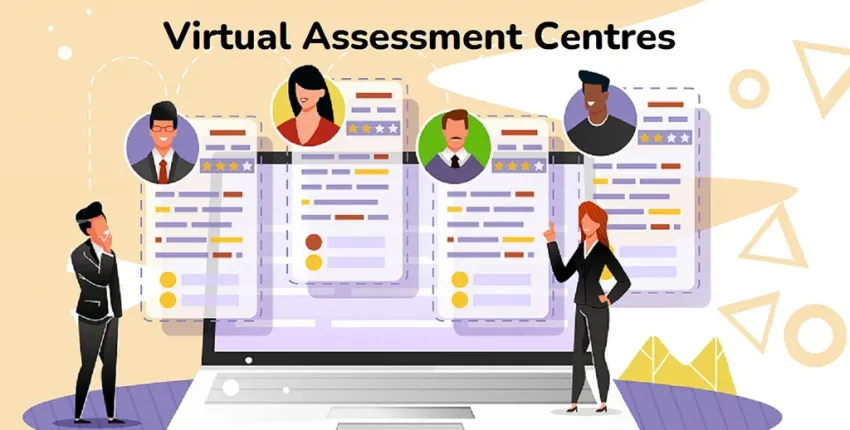
Menu

Menu

Assessment centres have long formed an invaluable part of the recruitment process. Essentially, an assessment centre provides candidates with the opportunity to complete a series of activities and tests to demonstrate their suitability for a particular role. Typically, these activities are based on the organization’s behavioral competency framework, which helps to standardize assessment, performance management, and people development.
However, while assessment centres were traditionally held in the workplace, where several assessors observed candidates simultaneously, organizations are starting to move their assessment centres and onboarding processes online. This shift accommodates both individual and group sessions, making the process more flexible and accessible for candidates.

Assessment centres consist of various elements, including personality and cognitive ability tests, situational judgment tests, and day-in-the-life scenarios. Additionally, they often incorporate role plays, case study simulations, and in-basket exercises. Moreover, presentations and competency-based interviews are also integral components of the assessment process, along with other similar activities.
All of these elements can be moved online, and virtual assessment centres have the following benefits:
Traditional assessment centres can be expensive. For instance, booking rooms and arranging logistics such as travel, food, and accommodation require significant time and resources. In contrast, virtual assessment centres can provide a similar level of engagement but at a much lower cost.
It is not unusual for a traditional assessment centre to take weeks to plan and execute from start to finish. However, online assessment centres can automate many administrative tasks, such as scheduling, test management, recording results, and providing feedback. As a result, planning and running an assessment becomes far more time-efficient. Additionally, candidates save travel time and benefit from receiving results earlier in the recruitment process. Furthermore, if the candidates are internal, the organization also saves on potential downtime from work.

Virtual assessment centres provide a level of scalability not possible with traditional on-site centres, particularly for organizations with bulk-hiring needs. Specifically, virtual assessment centres enable organizations to conduct assessments simultaneously at different locations. Moreover, this approach does not compromise the quality or the results of the assessments.
Traditional on-premise assessment centres can be subject to bias and human error. In contrast, a virtual assessment centre relies more on automated activities and testing, with little or no subjective involvement from an assessor. As a result, the standardization of testing and marking reduces the risk of candidates experiencing an unfair process. Furthermore, this approach enables those running the centre to have greater confidence in the results.
Candidates completing the assessments online may also experience less stress, as they are not required to travel and can complete activities in familiar surroundings. Moreover, virtual assessment centres can be customized to individual needs, thereby avoiding the typical “one size fits all” approach found in traditional centres. Additionally, assistive technology can help create a fairer environment for individuals with disabilities.
Traditional assessment centres create mounds of paperwork that need to be reviewed and stored, ranging from test and activity texts to feedback and results. Moreover, much of this content is considered confidential to ensure a fair approach for all candidates. Consequently, paperwork must be accounted for at the end of each session.

In addition to the immediate benefits of having everything recorded online, an added advantage is that the data is readily available for analysis, audit, and benchmarking. As a result, this accessibility helps improve the process’s transparency and quality.
Furthermore, the candidate experience is significantly improved through virtual assessment centres. For instance, candidates can participate from any location, thus allowing them to engage in the assessments without the stress of commuting. Moreover, this convenience encourages candidates to approach the assessments with a positive mindset, which can ultimately lead to a more accurate evaluation of their abilities. Additionally, the flexibility of online platforms enables candidates to choose times that best fit their schedules, thereby leading to increased comfort and better performance. This adaptability not only respects the candidates’ personal commitments, but it also fosters a sense of autonomy, which enhances their overall experience with the organization.
Moreover, virtual assessment centres can utilize interactive technologies, such as gamification, to significantly increase candidate engagement. By incorporating game-like elements into the assessment process, organizations can effectively create a more enjoyable and stimulating experience for candidates. In fact, features like leaderboards and rewards for completing tasks can motivate candidates to perform at their best. Consequently, this engagement not only helps candidates perform better but also positively influences their perception of the organization. As a result, candidates are more likely to view the organization as innovative and forward-thinking, which can subsequently enhance its employer brand and attract top talent.
In addition, virtual assessment centres facilitate continuous improvement in the recruitment process. By leveraging data analytics, organizations can systematically gather insights into the effectiveness of their assessments and identify areas for enhancement. For example, analytics can reveal patterns in candidate performance and highlight specific competencies that may require further assessment or development. Consequently, they can adapt their strategies based on candidate feedback and assessment outcomes, leading to ongoing refinement of the recruitment process. Ultimately, this iterative approach ensures that organizations remain competitive in attracting the right talent while continuously enhancing their assessment methods.
Finally, virtual assessment centres promote greater accessibility and inclusion in hiring practices. For example, candidates with disabilities or those living in remote areas can participate without the barriers often associated with traditional assessment centres. In addition, virtual platforms can offer accommodations, such as screen readers or captioning, to further support diverse candidates. As a result, organizations can broaden their talent pool and ensure a more diverse group of candidates, thereby enhancing their overall workforce. Moreover, this commitment to inclusivity not only enriches the organization’s culture, but it also aligns with social responsibility goals, thereby demonstrating a genuine dedication to equity in the hiring process.
Contact us at HRBluSky today to learn how we can support your recruitment process.
Alignment
Article
Audit
Automation
Benefits
Candidate
Communication
Compliance
Digitalisation
Digital Technology
Diversity
Emirates Id Application
Employee Experience
ESS
Feedback
Health and Safety
HRMS
HR Strategy
HR System UAE
Human Resource Management
Human Resource Management Systems
Job Roles
Learning and Development
Onboarding
Outsource
Payroll
Payroll Management System
Payroll Processing
Performance
Performance Management
Personalisation
Recruit
Recruiting
Recruitment
Remote Working
Rewards
Security
Service Providers
Skills
Smart
Survey
Virtual
Visa Cancellation
Work Environment
Workforce
© 2026 Pruvity HR Solutions Pvt Ltd, Madurai, India